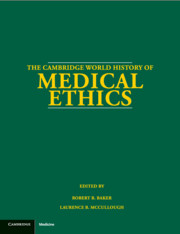Book contents
- Frontmatter
- PART I AN INTRODUCTION TO THE HISTORY OF MEDICAL ETHICS
- PART II A CHRONOLOGY OF MEDICAL ETHICS
- PART III DISCOURSES OF MEDICAL ETHICS THROUGH THE LIFE CYCLE
- PART IV THE DISCOURSES OF RELIGION ON MEDICAL ETHICS
- PART V THE DISCOURSES OF PHILOSOPHY ON MEDICAL ETHICS
- PART VI THE DISCOURSES OF PRACTITIONERS ON MEDICAL ETHICS
- PART VII THE DISCOURSES OF BIOETHICS
- PART VIII DISCOURSES ON MEDICAL ETHICS AND SOCIETY
- Ethical and Legal Regulation of Medical Practice and Research
- B Medical Ethics, Imperialism, and the Nation-State
- C Medical Ethics and Health Policy
- 59 Making Distinctions “Natural”: The Science of Social Categorization in the United States in the Twentieth Century
- 60 History of Public Health Ethics in the United States
- 61 Ethics and Health Policy in the United Kingdom and the United States: Legislation and Regulation
- 62 Ethical Issues in Organ Transplantation in the United States
- 63 Defining and Redefining Life and Death
- Appendix: Biographies: Who Was Who in the History of Medical Ethics
- Bibliography
- Index
60 - History of Public Health Ethics in the United States
from C - Medical Ethics and Health Policy
Published online by Cambridge University Press: 28 May 2012
- Frontmatter
- PART I AN INTRODUCTION TO THE HISTORY OF MEDICAL ETHICS
- PART II A CHRONOLOGY OF MEDICAL ETHICS
- PART III DISCOURSES OF MEDICAL ETHICS THROUGH THE LIFE CYCLE
- PART IV THE DISCOURSES OF RELIGION ON MEDICAL ETHICS
- PART V THE DISCOURSES OF PHILOSOPHY ON MEDICAL ETHICS
- PART VI THE DISCOURSES OF PRACTITIONERS ON MEDICAL ETHICS
- PART VII THE DISCOURSES OF BIOETHICS
- PART VIII DISCOURSES ON MEDICAL ETHICS AND SOCIETY
- Ethical and Legal Regulation of Medical Practice and Research
- B Medical Ethics, Imperialism, and the Nation-State
- C Medical Ethics and Health Policy
- 59 Making Distinctions “Natural”: The Science of Social Categorization in the United States in the Twentieth Century
- 60 History of Public Health Ethics in the United States
- 61 Ethics and Health Policy in the United Kingdom and the United States: Legislation and Regulation
- 62 Ethical Issues in Organ Transplantation in the United States
- 63 Defining and Redefining Life and Death
- Appendix: Biographies: Who Was Who in the History of Medical Ethics
- Bibliography
- Index
Summary
INTRODUCTION
Although “public health ethics” as a concept has existed for less than two decades, political leaders and medical officials have long made moral and value-laden decisions designed to protect the health of the community. History, by revealing the social and cultural forces that inform scientific policies, is an ideal approach for understanding the controversies that have arisen in public health – both before and after they were termed “ethical” in nature (Fee 1993). This chapter will focus on public health ethics in the United States since 1900, drawing, where appropriate, on events that occurred prior to the twentieth century and in other countries. It will highlight a series of controversies that have characterized public health ethics, explicitly noting the relevance of these issues for modern ethicists, health officials, clinicians, and the general public.
In contrast to medical practice, which emphasizes the care of specific patients, and bioethics, which stresses patients’ rights, public health is concerned with health and disease among populations. Although public health interventions are justified in terms of their potential benefit to the populace, they may do so by restricting the liberties of other citizens. Thus, a central theme of public health ethics is the tension between protecting the overall health of such populations and the rights of specific individuals who live in these communities.
- Type
- Chapter
- Information
- The Cambridge World History of Medical Ethics , pp. 655 - 666Publisher: Cambridge University PressPrint publication year: 2008

